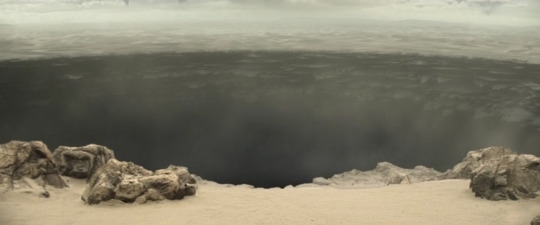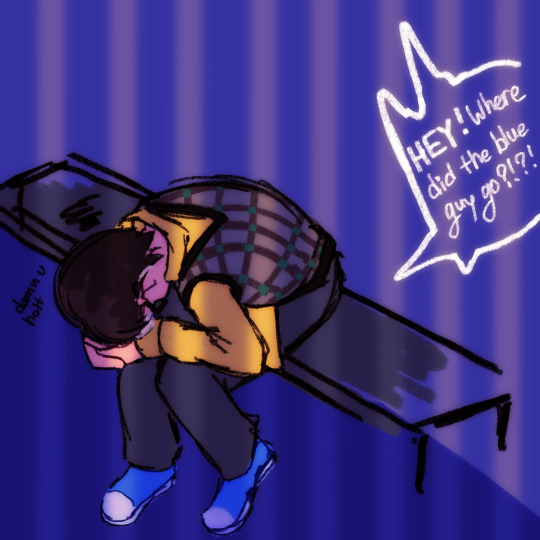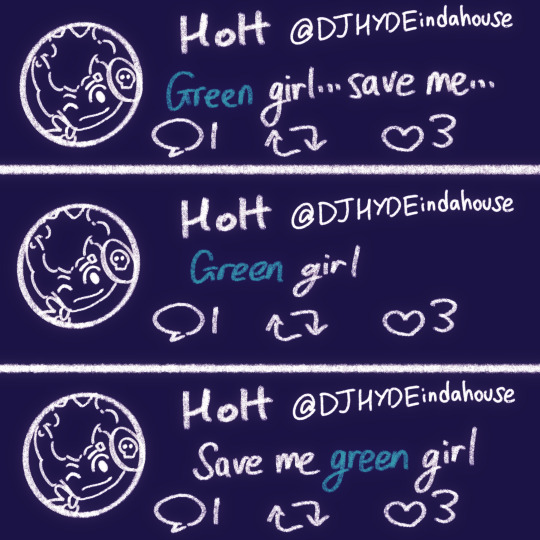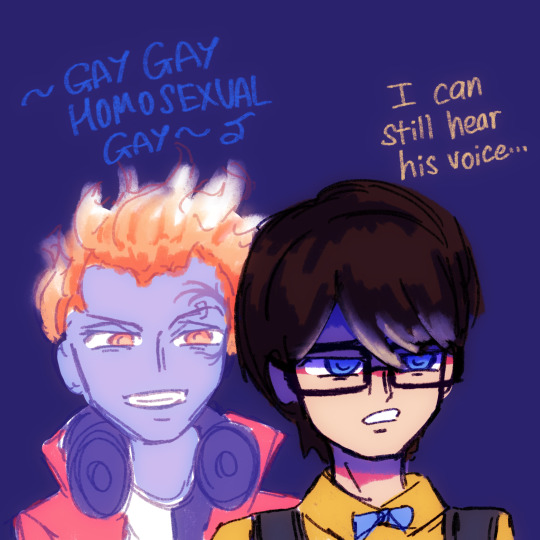#“Jackson hole”
Text
Honestly, I think from the moment that Percy found out that not every demigod has a loving mortal parent they can depend on, when they already can't depend on the gods, and that Annabeth specifically, hasn't had anyone take care of her like that since she was 7, he decided he would be the one to.
They take care of each other up to that point, but I think that's when he starts noticing how much she takes care of them. She already knew if she didn't no one else will. She protects them against humans, she stands with them against monsters, she always brings up the rear of the group when they're running, and she is always the first one to make a move when they're fighting. She does it because no one is going to protect her if she doesn't do it herself. No one is going to protect Grover and Percy if she isn't.
In the arch, he pretty much tells her he would fight the gods for her, and then he goes on to do just that.
Athena, the one person who was supposed to protect her willingly pushes monsters her way, she lets Echidna and the chimera into a place that was supposed to be safe. Her decision is that Annabeth should be punished, and say what you want, but I think she knew that Annabeth would think through every scenario and know that someone had to stay and hold them back. And I think she knew that Annabeth would be the one to stay. Because that's the way she raised her, knowing that no one cared whether she lived or died. And I think that's the cruellest part.
Which is why Percy's sacrifice means so much more. He not only made the decision to trade his life for hers and fight the monster so she and Grover could escape, but he also made the conscious choice to push back against Athena's wishes. He fought a goddess for her, Athena said "Annabeth will die for her impertinence" and Percy said "Not today, not ever"
#what if i sobbed#what if i jumped out a window#what if i fell out of a hole in the top of the arch#they're in love#they're healing#THEY"RE HEALING#percabeth#annabeth chase#percy jackson#percy jackon and the olympians#percy jackson and the olympians#the lightning thief#pjo#pjo tv show#walker scobell#leah sava jeffries#pjo tv series#episode 4
8K notes
·
View notes
Text
“This show isn’t the same as the book” this
“This show isn’t good” that
THIS is a show made for middle schoolers, and I’m having way to much fun watching this show for yall to act like it’s supposed to be peak media
#like please just enjoy it#you looked past the plot holes when you were kids#let’s do it again#and just enjoy ourselves instead of finding a reason to dislike it#embrace change#percy jackon and the olympians#percy jackson#annabeth chase#grover underwood#percy jackson show#pjo
1K notes
·
View notes
Text

THE OL' QUARTER (or pearl) IN THE EAR
Spiritual successor to this. he gets it from his dad
#GETS THEM EVERY TIME!! THE OLDEST DAD TRICK IN THE BOOK#posiedon: questions yes i can um answer those uhhh i caST HOLE IN THE GROUND#pjo#percy jackson#percy jackson tv series#percy jackon and the olympians#percy jackson tv show#pjo tv show#pjo spoilers#percy jackson spoilers#posiedon#my art
477 notes
·
View notes
Text

High peaks of the Teton Range, Grand Teton National Park, Wyoming.
366 notes
·
View notes
Text
No but I gotta talk about Medusa for a minute actually.
It's been. A very long time since I read the PJO books so I don't exactly remember how Uncle Rick presents Medusa in the book. But the way the show introduces her myth? Fascinating. For me as a Greek mythology enthusiast, that is.
The show makes Medusa a victim of Athena. Of course, the show is mainly for kids, so they can't exactly say that, hey, kids, Medusa was Athena's priestess and she was raped by Poseidon, YEP, or protagonist's father, IN Athena's temple, nah, that's neither kid-friendly nor does it endears us to Poseidon. Not that Poseidon is very dear to us viewers/readers at this point, our narrator/protagonist can't stand his own dad.
But still what fascinates me is that even though they twisted the myth to ft the narrative they still managed to evoke Athena's curse as being actually a gift, and Medusa not feeling wretched over her condition but blessed.
Which is not a modern reading of the myth, actually. Saying that Athena couldn't punish Poseidon for his transgression and could only punish Medusa, but did so in a way that would give Medusa weapons to defend herself against whoever and whatever would try to harm her again, is a narrative that exists since Antiquity.
My point is that the re-framing of Medusa's myth, departing from the traditional, non-kid-friendly version while still incorporating both classic and modern elements, is a good frame of reference for the series (book and show)' entire approach to mythology. And I guess I'm saying that mostly for the non-book readers who are discovering this world, many of whom might be Greek mythology fans and might have gone "wait, why is Hades AGAIN presented as the bad guy when he's the chillest, most normal, most stable god in this entire pantheon", because that's a conversation the book fandom has been having (over and over again) for more than a decade.
Anyway, yeah. As a long time book fan and a show appreciative, here's my advice to anyone who knows WAY too much about Greek myths and still want to enjoy the ride without going every five minutes "wait, that's not correct": reframe. Contemporary rewritings, modern audiences and Fantasy genre.
#pjo series#pjo series spoilers#pjo#percy jackson#percy jackon and the olympians#rick riordan#medusa#greek myths#greek mythology#rapha talks#the funny thing is that one of the art exhibition i've been giving tours of these past couple of months is about goddesses#and it has some statues and objects about both athena and medusa so i've been talking a lot about these two for weeks now#so even though i still remember some from the books and i know damn well uncle rick's priority wasn't myth accuracy#i still got a bit floored by the planet-size holes in medusa's myth in the show#not enough to dislike the episode (au contraire i quite enjoyed it) but enough to feel compelled to say a word about it#(can you tell my special interest as a weird little girl was greek mythology and how it still is to this day...)
456 notes
·
View notes
Text
The Most Powerful Hack to Make Your Readers Cry
You’ve seen it all: show, don’t tell, plant a visceral image in the reader’s brain of the environment/character, write a complex character arc with lots of growth and setbacks, establish deep relationships, high stakes, etc.
All the advice for making readers cry I’ve seen so far is basically that list. But, while those things are absolutely important, I find that the thing that always does the trick, whether as a tipping point or in and of itself, is this:
THE CALLBACK!
Before we move on, this is an ANALYSIS heavy post, so all the book + show examples contain spoilers!!
So, what do I mean by a “callback?” Think of Chekhov’s gun, but, here, you use the gun to pierce your reader’s heart. As a refresher for anyone who needs it, Chekhov’s gun is just a rule in writing that anything you introduce in the book should play some role in the plot.
Specifically, the name comes from the example that if a reader introduces a gun in the first act, it MUST go off later, (maybe, say, in the third act). For example, in the TV show Breaking Bad, the protagonist Walter White prepares a vial of poison (ricin) that he wanted to use to eliminate an opponent early on in the series. After the assassination attempt falls through, the ricin makes an appearance again in the very last episode of the show, when Walt finally uses it to kill another opponent.
Got that? Alright, onto the examples of successful, tearjerking callbacks:
1. The Last Olympian (Rick Riordan); “Family, Luke, you promised.”
Context: The character Annabeth says this line. Years ago, Annabeth had run away from home, and Luke had effectively adopted her into a found family with another kid named Thalia. Common reason for leaving home = parental trauma! Yay! He promised Annabeth that they would be each other’s “family” from now on.
Now: Kronos, the antagonist titan, has possessed the demigod Luke and uses his body to strike Annabeth, injuring her. She’s also holding a dagger that Luke had given her when she joined his “family.”
Significance: her words + the dagger are a mental + physical reminder to Luke of his promise. They force him to recognize the sheer degree of his current betrayal by bringing him back to a different time. The fact that their found family only happened because of parental trauma bringing them together makes it worse—Luke felt abandoned by his Olympian father, Hermes. Now, he realizes that he basically did the equivalent to Annabeth by joining the titans.
2. Les Miserables (Victor Hugo); Jean Valjean’s death
Context: At the beginning of the book, the bishop had caught Valjean trying to steal candlesticks to sell. Instead of handing him over to the police, the bishop told the police that he had given them to Valjean, saving him from arrest and showing him mercy. This changed his life forever, kickstarting his character redemption arc.
Now: Jean Valjean dies surrounded by his loved ones, remembered as a benevolent man who bettered thousands of lives. He’s surrounded by light from candlesticks that once belonged to a bishop.
Context: Valjean had once taken in an impoverished woman named Fantine, showing her mercy and promising to take care of her daughter, Cosette, after Fantine died. Valjean then rescued Cosette from abusive quasi-foster parents (it’s a long story), raising her as his own daughter. This furthered his arc by allowing him to finally understand how unconditionally loving someone feels.
Now: Valjean describes Fantine to Cosette, who never knew her mother.
Significance: Both examples throw readers back to much earlier points in the story before the completion of Valjean’s character arc. In a way, this final scene feels like an external manifestation of his kindness paying off; both he and the reader feels a sense of accomplishment, relief, and just a general “OMG WE MADE IT.” Readers don’t feel cheated, because they were with Valjean every step of his 1,400 page arc. The weight of it all just crashes down on you...
3. Your Lie in April (anime); Kaori’s letter after she dies
Context: Kaori’s entire plot significance is that she helps Kousei, a piano prodigy who can’t play piano anymore due to traumatic parental memories associated with it, play again—but also, just to help him enjoy life again after a turbulent upbringing. She meets him a year before she dies of a medical condition, and her free spirit + confidence influences him to find beauty in life and music again. They basically do a crap ton of crazy funny stuff together lol
Now: Kaori has died, and she leaves a letter to him. Among other general confessions and thoughts, she references things they did and memories they shared: she says, “sorry we couldn’t eat all those canelés,” reminisces about jumping with him off a small bridge into the stream below, “racing each other alongside the train,” singing Twinkle Twinkle Little Star as they rode the bike together, etc.
Significance: Yes, the nature of the letter is just sad because she’s revealing that she loved him all along, apologizing for not being able to spend more time with him, lying that she didn’t like him (to spare his feelings b/c she knew she would die soon), etc. BUT, these small details highlight exactly how many experiences they shared, and the depth of their relationship. Thus, they emphasize the significance of her death and the emptiness it leaves behind.
4. Arcane (show); “I thought, maybe you could love me like you used to, even though I’m different.”
Context: Character Jinx says this in the last episode to her now estranged older sister, Vi. Without going into the crazy complex plot, basically, orphans Vi and Jinx used to care for each other before a bunch of crap went down that got them separated. They then grew up on opposite political sides; Jinx grows up on the side of the underbelly city rebellion, and Vi grows up working on the side of the richer city that essentially oppresses the undercity. Thus begins the development of their opposing viewpoints and work environments, to the point where they always meet on opposite sides of a political battle, never able to come together as a family or understand each other again.
Now: After a super dramatic confrontation, Jinx reveals that although she wants Vi to love her like she did before their separation, she knows it’s not possible because “[Vi] changed too.” She finishes with, “so, here’s to the new us” before blowing up a political council meeting a few blocks down filled with people Vi sides with. Oops! This cleanly seals the fate of their relationship as something basically irreparable.
Significance: This callback isn’t through literal flashbacks or items like in the previous examples. Jinx’ lines are enough to bring back images of their childhood to the audience’s mind. Now, the audience subconsciously places this image of: 1) two sisters so different, hurt, and torn apart, right next to 2) the image of two sisters as innocent children who loved each other and would care for each other no matter what.
Why do callbacks work so well?
If you’ve noticed something in common with all of them, you’re right: they remind audience of a time BEFORE the characters have come so far on their arcs, developed, and put on so much more emotional baggage.
Callbacks force the audience to SUDDENLY and IMMEDIATELY feel the weight of everything that’s happened. The character’s anguish and overwhelming emotions become the audience’s in this moment. Callbacks are a vehicle for the juxtaposition of worlds, before and after significant development.
This works because we, as mortals, fear IMPERMANENCE the most. We fear LOSS. For us, time gone is time we will never get back; callbacks make us face that exact fact through a fictional character. A lost moment, time period, or even part of oneself may hurt as much as losing a loved one, and nothing makes humans grieve more than the realization of a loss. A callback slaps the audience in the face with the fact that something was lost; loss hurts so much because almost 99% of the time, what’s gone is gone forever.
Of course, a good callback requires good previous character development, stakes, imagery, and all that jazz, but I thought I’d highlight this specifically because of how under covered it is.
∘₊✧────── ☾☼☽ ──────✧₊∘
instagram: @ grace_should_write
I’ve been binging general media lately: I finished Death Note, Your Lie in April, and Tokyo Ghoul all within like a month (FIRST ANIMES I”VE EVER WATCHED!!), reread lots of Les Miserables, analyzed a bunch of past shows like Breaking Bad, watched a bunch of My Little Pony, worked to fix up my old writing... and that’s not even all! The amount of times I’ve CRIED while enjoying the above media and so much more honestly just inspired this post.
Like, no joke, my eyes were almost always swollen during this period whenever I hung out with my friends and it was so embarrassing help
Personally, I just find that this method works super well for me, and I watched a bunch of reaction videos to these above scenes (and read book reviews on the book scenes I mentioned), and it seemed that just about everyone cried during these parts. That’s when I realizes that the callback might also just be a universal thing.
Anyway, this post is long and dense enough as is. SORRY! As always, hope this was helpful, and let me know if you have any questions by commenting, re-blogging, or DMing me on IG. Any and all engagement is appreciated <3333
Happy writing, and have a great day,
- grace <3
#writers on tumblr#writing tips#writing#booktok#writer#writeblr#novel#writerslife#writergram#wattpad#media analysis#wip#ya fantasy#plot holes#characters#writing ideas#writing a book#anime#your lie in april#percy jackson#arcane
671 notes
·
View notes
Text
Do you think the show-only fans are wondering about the string of fate? Are they scratching their heads and wondering who’s string that was there if nobody died yet? Do they think it was a plot hole or something? Just curious.
#cuz from their perspective it looks like a plot hole#I thought it was a plot hole when I read the books#percy jackson#pjo#percy jackon and the olympians#percy jackson and the olympians#pjo tv show#percy jackson tv show#pjo spoilers#percy jackson the lightning thief#pjo series
312 notes
·
View notes
Text

Mule deer, near Jackson Hole, WY [2-1-24]
179 notes
·
View notes
Text







48hrs in Jackson Hole | 2023
#film photography#filmisnotdead#filmisalive#analog photography#35mm#analog#photographers on tumblr#35mm color film#jackson hole#grand teton national park
266 notes
·
View notes
Text


National Elk Refuge
Jackson, Wyoming
#wyoming#analogue#35mm#film photography#original photography on tumblr#photographers on tumblr#nature photography#hiking#the great outdoors#national park#grand teton national park#jackson hole#jackson#wildflowers#landscape photography#mountains#valley#cottagecore#nature aesthetic#naturecore
518 notes
·
View notes
Photo






Morning Photo Flight Over Jackson Hole
View more Photos: https://stephenwilli.com/morning-photo-flight-over-jackson-hole/
546 notes
·
View notes
Text

204 notes
·
View notes
Text
the tartarus hole is HUGE

#for some reason i always imagined it as like a crack on the ground#a HUGE crack#but apparently it's a hole#pjo tv show#percy jackson#percy jackon and the olympians#pjo series#pjo#pjo tv series#pjo spoilers
122 notes
·
View notes
Text
I’m a little sad we didn’t get an ambiguous non explanation for how Percy fell into the Mississippi River from the St. Louis arch to preserve that gem of a plot hole
#it has plot holes#look it has pockets!!#the plot holes are nostalgic okay#pjo ep 4#percy jackson#percy jackon and the olympians#percy pjo#pjo tv show#pjo series#pjo#pjo fandom#pjo disney+#pjoverse
114 notes
·
View notes
Text

The Teton Range from Signal Mountain, Grand Teton National Park, Wyoming.
591 notes
·
View notes
Text



Ok so I recently rewatched ghoul’s rule after a decade and like
It held up surprisingly well hahahahahahahah
The whole movie truly was Jackson’s (and holt’s) no good very bad very horrible extremely terrible day! The whole time he was just going through it!
I’ll draw them properly one day but for now here’s some memes
#monster high#jackson jekyll#holt hyde#I really had to laugh at the ending like I know it’s a kid’s movie so they can’t go TOO dark but like#they really ended prejudice and hate crimes with a dance party HAHAHAHAHHAHAHA#Like poor Jackson and holt nobody even apologised to them!!!#it was so funny seeing Jackson at a normie high school though like throw that poor guy a bone let him enjoy being normal hahahah#but the sad thing is that he’s not very normal at all according to normie standards :)#rewatching this movie is making me dig a rabbit hole about these two
134 notes
·
View notes